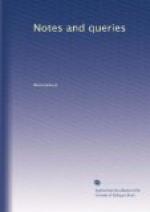J.M.
Oxford, April 24.
["M.” may also be referred
to the Catalogus Dissertationum
Academicarum quibusnsuper
aucta est Bibliotheca Bodleiana. A
quarto volume, printed at
the Oxford University Press in 1834.]
MSS. of Locke (No. 25. p. 401.).—“C.” is informed {462} that Dr. Thomas Hancock died at Lisburn, in Ireland, during the past year. The papers of Locke respecting which he inquires are probably still in the possession of Dr. H.’s son.
[Greek: Theta]
* * * * *
MISCELLANIES.
Spur Money.—Although I used often, twenty years ago, when a chorister at the Chapel Royal, to take part in levying a fine on all who entered that place with spurs on, I was not aware of its origin till I saw it explained in your interesting publication (No. 23. p. 374.). There was a custom however, connected with this impost, the origin of which I should be glad to learn. After the claim was made, the person from whom it was sought to be exacted had the power to summon the youngest chorister before him, and request him to “repeat his gamut,” and if he failed, the spur-bearer was entitled to exemption.
E.J.H.
Spur Money.—I beg to offer the following humble illustration of spur-money, which I copied from the belfry wall of All Saints Church at Hastings:—
1.
“This is a belfry that is free
For all those that civil be:
And if you please to chime or ring,
It is a very pleasant thing.
2.
“There is no musick play’d
or sung,
Like unto bells when they’re well
rung:
Then right your bells well, if you can—
Silence is best for every man.




